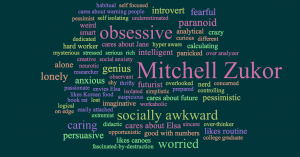Check out this recent article, “What is cli-fi? And Why I Write It,” by children’s and young adult (YA) fiction writer Sarah Holding. In it, Holding explains why she chooses to write in the cli-fi genre, and especially why she writes cli-fi for young people:
“I write cli-fi because it reconnects young readers with their environment, helping them to value it more, especially when today, a large amount of their time is spent in the virtual world. Cli-fi advocates restoring equilibrium to our physical environment, making it not just a setting or backdrop to a story, but a story’s primary purpose and emotional appeal. The characters in my writing are genuinely concerned about the environment and want to make a difference, which I hope is contagious and spreads to my readers too.”
Some of Holding’s ideas might be especially useful for those of you who are thinking of creating a work of cli-fi for the final project that is aimed at a younger audience. Holding also speaks more generally about the importance of imagining different futures, of engaging in speculative practice (something we experimented with during class last Friday): “Cli-fi has allowed me to participate imaginatively in rewriting our future, a future on which we all depend… cli-fi makes young people realise that they too can rewrite our future.”
